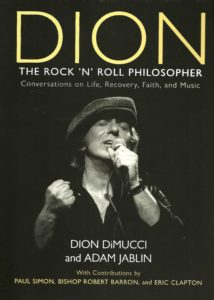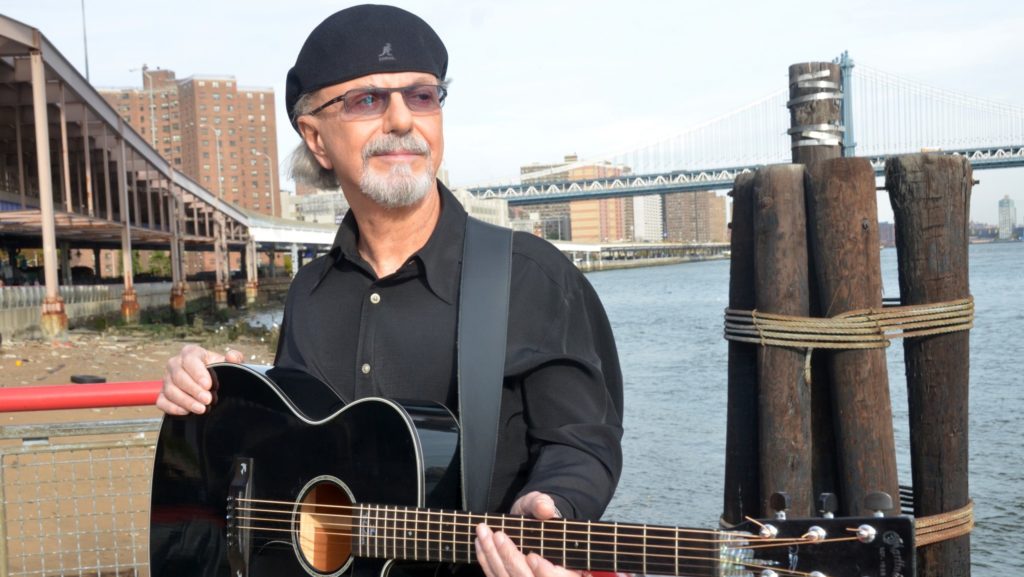What does a longtime musician, troubadour, rock and roll hall of fame inductee and contemplative Catholic do for an encore? If you're Dion DiMucci, you just keep on making new music, and singing the praises of a Christ-centered existence.
DiMucci, known throughout his nearly 70-year recording career by his first name Dion, distinguished himself from many rock and roll colleagues in the late 1960s by publicly recommitting himself to his Christian faith.
Dion's return to faith came as the singer struggled to overcome drug dependencies that developed shortly after his first taste of commercial and popular success. Dion had scored a number of hit songs in the late 1950s, and secured a lucrative recording contract before he was 21 years old.
Following a musical and emotional dry period, Dion returned to the charts in 1968 with the hit recording "Abraham, Martin and John," a lament about the assassinations and political turmoil in the U.S. in the wake of the civil rights struggle.
It was about this time that Dion entered an addiction recovery program and took the first steps on the road to sobriety and inner contentment. One of the lasting lessons for Dion on the way back was understanding the difference between commercial success and personal fulfillment.
Dion's return to wholeness and spiritual tranquility is a key feature of his new memoir "The Rock 'N' Roll Philosopher," a series of conversations about life, recovery, faith and music.
In the preface to the new book, Bishop Robert Barron of the Diocese of Winona-Rochester, Minnesota, and head of Word on Fire Catholic Ministries, discussed the "breakthrough of divine grace" that helped Dion bounce back from debilitating addiction.
"Dion placed great stress upon the four principal temptations that the spiritual masters have identified as substitutes for God: wealth, pleasure, power and honor," Bishop Barron said, adding that detachment from material things is key for anyone looking to follow a Christ-centered path.

In a series of interviews with OSV News, Dion reflected on how the recommitment to the faith has sustained his 57 years of sobriety and clean living. He also shared his thoughts on man's fallen nature.
"I have a trusting nature, but I never expect too much out of people today," Dion said. "We are born fallen, and when people come up to me and ask if we are good or bad, I still believe we are basically good. But it's always 'iffy' because we are fallen. There is something very good in us, but it has to be nurtured and brought forward. If it isn't, things can really go sideways."
These are humble but powerful words from the son of working-class Italian-American parents who, despite being registered at Our Lady of Mount Carmel parish in the Bronx, New York, were not especially fervent in their practice of the Catholic faith.
Dion said growing up in the Bronx wasn't particularly onerous, but it was difficult at times to avoid the street gang culture that often called on young men to prove themselves through defiance and rejecting most forms of legitimate authority. He also related how a lack of confidence in his own worthiness led to an ongoing pattern of seeking approval from others.
Although Dion first rose to fame more than 60 years ago with such hit recordings as "The Wanderer," "Runaround Sue," "Ruby Baby" and "Lovers Who Wander," he refuses to rest on past laurels. He continues to record blues-based albums along with cherished music colleagues such as Bruce Springsteen, Eric Clapton and Paul Simon.
Some of Dion's recent albums have a Gospel music flavor, but he does not aim to preach with his contemporary music. Nonetheless the lyrics of certain of Dion's blues-based songs are unmistakable in their Christ-focused messaging.
His song "The Thunderer" for example, is based on the life and work of St. Jerome, the fourth-century saint who first translated the Bible into Latin. The song juxtaposes Jerome's prickly personality with his passion for rendering the Scripture into the language of the common man. As the lyrics warn us: "[You] can't get through life by just being nice / Ignorance of scripture is ignorance of Christ / Love without truth is just sentimental / Truth without love is sterile."
Additional insights into Dion's attitude to faith, music and life in general come by way of his mentor and song-writing partner, Mike Aquilina. The co-founder of the St. Paul Center for Biblical Theology in Steubenville, Ohio, and author of several books on the church's patristic era, Aquilina cites the positive effect Dion has on his listeners and on his fellow musicians.
Aquilina said Dion was a "colossal figure" for Italian-Americans as they were still assimilating in the America of the 1950s and '60s.
"A key part of evangelization is friendship, and Dion's career has placed him in the lives of great artists," Aquilina told OSV News. "Look at the list of the folks he's worked with on the last few albums. These men and women have been his friends for many decades. That means he's been in their lives and has exercised some influence. Dion has a great sense of humor, but he doesn't have shallow conversations, and these people know that. He remains their friend because they value his spirituality."
Aquilina also said some of the "explicitly religious" content of Dion's more contemporary music can be seen as a form of evangelization. "[The song] 'Angel in the Alleyways' for example, is about guardian angels," he said, "'Can't Go Back to Memphis' is really the story of Adam's expulsion from Eden. But I think everything he does reflects a Christian perspective. Even songs that reflect the gritty realities of addiction, like 'Cryin' Shame,' show how we're punished by our own sins."
When not performing or lining up new recordings, Dion dedicates several hours each week helping people recover from addictions and substance abuse problems. "This is a huge part of his life, and it's a religiously motivated mission," Aquilina said. "Dion knows he's been saved from death and misery and he wants to help others find that salvation."
Although he is by no means a theologian, Dion has helped draw attention to a lesser-known element of church teaching about sin and punishment. In interviews and in his offhand comments to friends and followers, Dion advances the idea of humility as "the healer of pain." As Bishop Robert Barron has noted "[Dion] explains that we are punished by the [sinful] act, not for it. I don't think [16th-century Doctor of the Church] St. John of the Cross could have said it better."
Despite turning 86 years of age in July, Dion has no plans to slow down. He divides his time between Boca Raton, Florida, where he is a member of St. Jude parish, and New York where he maintains an apartment.
He is soon to release an album to accompany the "Rock 'N' Roll Philosopher" book, and he is keeping tabs on production of the Broadway show, "The Wanderer," a musical loosely based on his early days as a rocker and "doo-wop" pioneer. The show has been put on already in smaller theatres in New Jersey, but its Broadway debut is certain to bring the Dion story to a new generation of music fans.
Dion said the show has strong, obvious, transformative and redemptive components. "But it's in a very beautiful, good and true way, using the language of the heart in song and lyrics."
Whatever the success of "The Wanderer" on Broadway, Dion has no intention of reordering his priorities in life. Nor does he plan to stop producing music. He remains grateful for the discernment of long ago that enabled him to understand the difference between success and fulfillment.
"I believe without God in my life all the pressure of life is on me to figure out everything [and] to come up with a position on everything," he said. "When you have faith in God, [you know] he has a plan for your life and you have moral clarity. To have his security, serenity, peace and freedom is a beautiful way to travel through this life. His friendship is primary, and I thank God he has given me this energy. He's been good to me."

